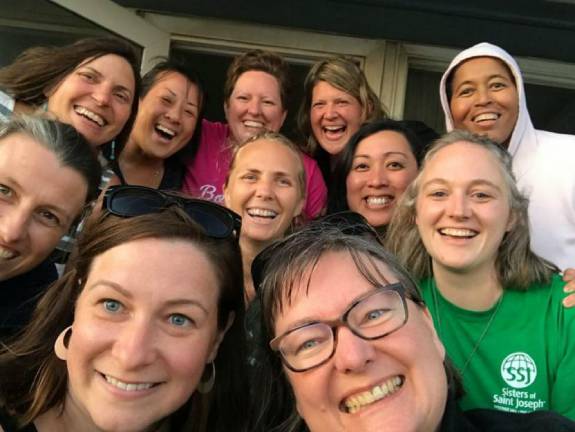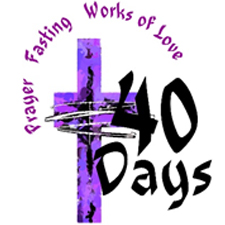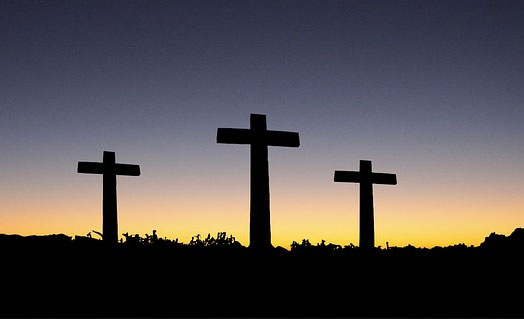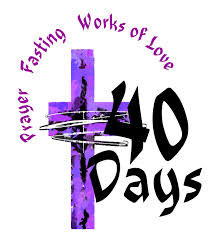A Reflection for Easter 2015
*
“Gratitude…Passion…Hope”
Fifty years ago on April 24th in St. Anthony’s Parish (fondly known as Tony’s Roundhouse), I began novitiate, receiving the habit as an Ursuline of Jesus. Even though I had a boyfriend who was very special to me, and who I know loved me, I could not ignore the promptings of the Spirit that were drawing me to live out my Baptismal commitment within the context of consecrated Religious Life.
The time of my entry into Religious Life is very significant: Vatican Council Two ended in November of that year, which meant I had one foot in the pre-Vatican Church and the other in post-Vatican Two times. I found a sense of belonging in the post-Vatican Two Church that I had not experienced before Pope St. John XX111 “threw open the windows and let in some much-needed fresh air”! I felt at home with the language of the Decree on the Apostolate of the Laity. I knew I was called to be part of an apostolic congregation, inserted in the midst of the “People of God”: to be immersed in a Church that honoured the Baptismal call of every Christian seemed so right. I was called to be in the midst of, rather than above, my sisters and brothers. As an apostolic religious I was to take to heart the words of our founder: “You must leave the sweet solitude of your monasteries in order to give a Christian education to young girls of every class of society, not just from your cloister; but in the midst of the world, so you must satisfy these needs by a poor, hardworking life that is completely apostolic”. (Memoirs, M. St. Laurent) God was inviting me “to a life of adoration of the Word made flesh in the midst of the world”. (Covenant #32)
The changes that have occurred in the Church and society during the past 50 years are mind-boggling! Certainly in the Western world there has been a significant decline in the number of women and men entering Religious congregations. I won’t attempt to answer “why” (I leave that to your prayerful pondering) but I do recognize that the lack of vocations is a cause of concern and speculation for many. Some would say, “God is no longer calling people to consecrated life; others explain this phenomenon by saying, “It’s the era of the laity; let them provide the leadership that is rightfully theirs’ as baptized Christians”; others ask, “What have we done wrong?”. I would argue that these explanations do not go to the heart of the matter. Instead of asking “why”, I believe the question we should be asking ourselves and one another is, “how?”
How do we as consecrated women and men live this “in between” time- a time that in many ways resembles Holy Saturday? Ours is a reality very similar to that of Mary, the faithful women, John: much of what we have known and loved about consecrated Religious Life no longer exists, and Religious Life of the future is an unknown. It is as though the Risen Christ is saying to us, “Do not cling” [to what has been]. Ours, needs to be the attitude of those who waited in hope at the foot of the cross, hearing the One in whom “they had believed” surrender His very self and His entire mission into the hands of His God- “It is accomplished”. (Jn. 19:30) Although darkness covered the earth, they remained with Him who “had always loved those who were His own in the world, [and who] now showed them how perfect His love was”. (Jn. 13:1) As we live this poignant moment, with the help of the prayer style of guided imagery, we become part of these Gospel scenes. We hear Jesus say, “Know that I am with you always; yes, to the end of time’”. (Mt.28:20); “Tell no one about the vision until the Son of Man is risen from the dead” (Mt. 17:9). Perhaps we experience ourselves as those who wander away in fear and disillusionment and go to the upper room “where the doors are closed…for fear of the Jews”. (Jn. 20:19)
Going to the “upper room” might be viewed by some as an escape from the painful reality of aging membership, fewer people entering, having to make the difficult choice to not welcome new members, to embrace as some would say, “the death of consecrated Religious Life”. However, it can also be seen as an entering into the solitude of one’s heart to listen, to contemplate, to embrace the pain that comes from letting go and from surrendering to an unknown future. One can live it as an invitation from God to enter into dialogue with others; an opportunity to share faith at a profound level; it can be a time of entrusting to others the uncertainty and fear that can take hold of one’s heart. It is a time of waiting in hope, of living with the questions, a Kairos moment of surrender. It can be lived as a call to re-member, a time to gaze again with a renewed love at the One “who is without beauty, without majesty…. whom God was pleased to crush with suffering”. (Is. 53:10)
The “upper room” is that space within where we can hear the cry of the poor and the marginalized with “a new heart, a new soul”; where we can, as “Le Petit Prince” discovered, “see what is invisible to the eye”, and hear with the ears of our heart how we are called to help quench the thirst for compassion, justice, mercy, forgiveness and love in our world.
Our founder, Louis-Marie Baudouin, and foundress, Charlotte-Gabrielle Ranfray, lived many hours in silent contemplation of the Word of God in order to know how God was calling them to respond to the poverty and injustice, the faithlessness that surrounded them. Today, like them we must spend time pondering the Word of God, entering into the “upper room” of our hearts in order to know how to “contemplate, celebrate, live and announce” the good news in contemporary society. As an Ursuline of Jesus I ask myself, Am I prepared to “give an answer to those who ask a reason for my hope”? Have I surrendered to the silence, the stillness, the pain and emptiness of Holy Saturday? Or do I understand Holy Saturday as a source of great expectation in the Christian hope of the Gospels? Have I, as a consecrated woman Religious, really embraced the message of Pope Francis- “to live the past with gratitude, the present with passion and the future with hope”? Am I prepared to keep trying to build, with my sisters, resilient community life, to, in the words of Dr. Samuel F. Mikail, commit to “creating and nurturing communities that allow for risk-taking, without fear of shame or humiliation…to think beyond conventional ways to meet changing conditions with an agility, responsiveness and willingness to adapt”? (Horizon, Winter, 2014, vol. 35) This, I believe, is what it means to live into the Easter of consecrated Religious Life. It is living with hope, even in the midst of darkness and uncertainty; it means opening our hearts and our homes in welcome; it is breaking open the Word of God, and our lives, in faith sharing; it means announcing with our lives that “He goes before us into Galilee [and it] is there that we will see Him”. Living the joy of Easter is visible in our readiness to invite women and men to discern the possibility of a call to consecrated Religious Life. Being an Easter people shows itself in an attitude of loving confidence that Christ, our Risen Lord, continues today to say to us, as he did on the first Easter morn: “Peace be with you…. As the Father sent me, so am I sending you”. (Jn. 20:21) Alleluia!
Sr. Mary Clare Stack, u.j.
mctstack@gmail.com
www.incarnationweb.org






